|
|
|
Sort Order |
|
|
|
Items / Page
|
|
|
|
|
|
|
| Srl | Item |
| 1 |
ID:
079926
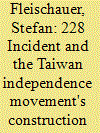

|
|
|
|
|
| Publication |
2007.
|
| Summary/Abstract |
After the Second World War, Taiwan was returned to Chinese authority after 50 years of Japanese colonial rule. Only 18 months later, the local inhabitants of the island revolted against the new Chinese rulers of the KMT regime, demanding a greater degree of autonomy. After a brief period of feigned negotiations, this uprising was brutally suppressed by military reinforcements from the mainland. This 228 Incident of 1947 came to play a pivotal role in the struggle of the Taiwan independence movement. One of the major tasks of the movement was to create and propagate a distinct Taiwanese identity, which would legitimate the strife for an independent Taiwanese nation. In the course of the last 60 years, however, these attempts to create a Taiwanese "We" group distinct from China have not been static, but have had to be redefined and renegotiated according to a changing international and domestic environment. These alterations of group demarcation have necessitated reinterpretations of the 228 Incident, as a means of maintaining its legitimizing power for the Taiwan independence movement. As could be observed in the spectacular 228 hand-in-hand rally in 2004, redefinition and renegotiation are still unfolding to this day.
|
|
|
|
|
|
|
|
|
|
|
|
|
|
|
|
| 2 |
ID:
079929
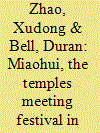

|
|
|
|
|
| Publication |
2007.
|
| Summary/Abstract |
We examine the multiple purposes and modalities that converge during a circuit of festivals, miaohui, which temples organize in recognition of local gods and which are attended reciprocally by temple representatives from the surrounding area in North China. The festivals involve intense expressions of devotion to one or more deities, while offering an opportunity for representatives of other villages to seek recognition through rather boisterous drumming and prolonged choreographed dancing. We note also the emergence of Mao as a great god whose legacy as Chairman of the CCP is projected in order to legitimate current Party leadership and their policy of reform while concurrently acting as a powerful denial of those same policies from the perspective of villagers.
|
|
|
|
|
|
|
|
|
|
|
|
|
|
|
|
| 3 |
ID:
079928
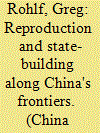

|
|
|
|
|
| Publication |
2007.
|
| Summary/Abstract |
This article analyzes population resettlement to western China during contemporary times within a historical framework that emphasizes gender. During the 1950s most relocatees to Qinghai were men, following the historical pattern set by Qing policies. Empirical data also show that the PRC government explicitly recruited women for relocation to border and remote areas. Women were moved to western regions as somewhat gender-neutral workers and also to serve in their traditional roles as wives and mothers. In both roles, women were a crucial component in state-building policies in border and remote areas. In fact, because sovereignty could not be permanently established without a naturally reproducing population, one can argue that reproduction was, and is, a basic component of state-building-an assertion that gets little attention in analyses of social and political change in border regions. This article describes the consolidation phase of territorial expansion as a feminine or yin process that relied upon incremental, organic growth, or "soft" assertions of power. Government documents, published materials, census records, and journalistic reporting are used to demonstrate these patterns and processes.
|
|
|
|
|
|
|
|
|
|
|
|
|
|
|
|
| 4 |
ID:
079927
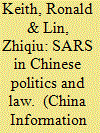

|
|
|
|
|
| Publication |
2007.
|
| Summary/Abstract |
This article surveys the Chinese response to SARS in law and politics. Over the course of the spread of SARS the party-state qualified legal reform strategy that was designed to provide new human rights protection and to curtail the state's arbitrary resort to policy and regulation without the benefit of law. This immediate response revealed the underlying problems of rule-of-law making, but the experience of SARS later informed the creation of new and improved law on infectious disease that reiterated the original assumptions of legal reform within a newly developing approach to the public management of health crises.
|
|
|
|
|
|
|
|
|
|
|
|
|
|
|
|
| 5 |
ID:
079930
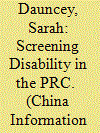

|
|
|
|
|
| Publication |
2007.
|
| Summary/Abstract |
This article outlines the political, social, economic, and cultural factors affecting disability representation in Chinese cinema from the founding of the PRC onwards, particularly after 1976. With reference to a wide variety of films that include main characters with visual, hearing, speech, physical, and learning impairments, it demonstrates how socialist realism, the equation of a "healthy" body with a healthy nation, and the great economic endeavor of the Mao era all contributed to the limitation of disabled people on the big screen, whilst the opening-up reforms, spiritual civilization campaigns, and commercial and critical demands of the post-Mao era effectively promoted their inclusion. At different times, the marginality of disabled people has resulted in them being overlooked as irrelevant, rejected as impaired, employed as a political tool, or identified as a marketable commodity. The representation or nonrepresentation of disability in Chinese film is closely linked to the politics of looking good
|
|
|
|
|
|
|
|
|
|
|
|
|
|
|
|
|
|
|
|
|